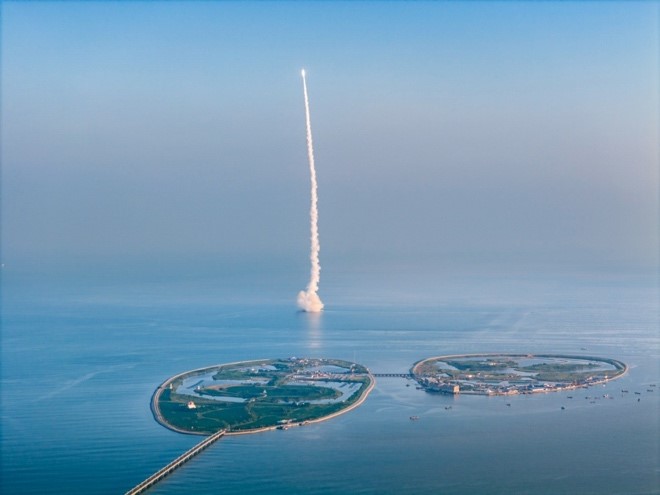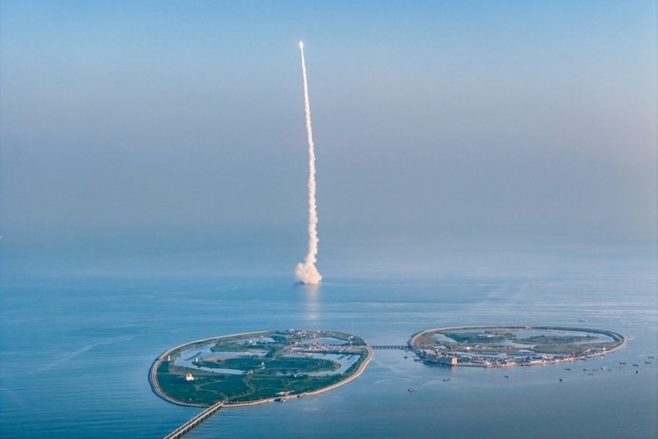
The CERES-1S Y2 carrier rocket lifts off from the Yellow Sea near Rizhao, east China's Shandong province, May 29, 2024. [Photo provided to China.org.cn]
Beijing is cementing its position as a national leader in the commercial space sector, with local firms breaking records in rocket launches and satellite technology as the city pushes for global industry prominence.
"Beijing's commercial space ecosystem is among the best in China — certainly in the top tier," said Xia Dongkun, executive president of Beijing-based launch service provider Galactic Energy, during a media tour of the company's exhibition hall on June 18.
Galactic Energy has completed 19 successful commercial missions, delivering 81 satellites with various functions into orbit. Its CERES-1 rocket holds the record for the most successful launches among China's privately developed rockets, underscoring Beijing's growing commercial space capabilities.
As the birthplace of China's space program, Beijing is implementing the 14th Five-Year Plan’s directive to promote the integrated development of strategic emerging industries.
The city has established a comprehensive commercial space supply chain, hosting more than half of the country's core aerospace R&D institutions and over 300 high-tech commercial space enterprises. Of these, 46 were named to the 2024 China Top 100 Commercial Space Companies list, accounting for nearly half of the national total and highlighting Beijing's leading position in the industry.
The city has established a distinctive spatial layout known as "Southern Rockets, Northern Satellites." In the south, areas such as E-Town and Fengtai district have become hubs for commercial rocket manufacturers, including industry leaders Landspace and Galactic Energy, representing more than 70% of China's commercial launch vehicle companies.
Meanwhile, Haidian district in the north has developed into the country's most advanced cluster for satellite manufacturing, boasting a fully developed supply chain for spacecraft production.
Beijing's technological achievements continue to set new industry benchmarks. Landspace's Zhuque-3 test vehicle completed a 10-kilometer vertical takeoff and landing, making it the first Chinese reusable rocket to demonstrate mid-air reignition.
Galactic Energy launched seven missions in 2023, ranking third globally among commercial space firms. In satellite technology, Galaxy Space carried out Thailand's first low-Earth orbit broadband satellite internet test in May 2024, marking China's first overseas deployment of such services.
On the international stage, Beijing is advancing the Chinese Academy of Sciences' International Meridian Circle Program, which recently completed its second phase after securing cooperation with 13 overseas institutions. The city also uses platforms like the Zhongguancun Forum's space sessions to promote global industry dialogue and expand space infrastructure partnerships under the Belt and Road Initiative.
Following the 14th Five-Year Plan's call to advance core technologies, the city has launched several initiatives, including establishing the Beijing Reusable Rocket Technology Innovation Center and supporting more than 30 research projects by firms such as Landspace. The city attracted 1 billion yuan ($139 million) in investment for seven commercial space and low-altitude economy firms in 2024 and released 10 initial application scenarios for technologies such as natural resource monitoring and emergency relief.
Looking ahead, Beijing's commercial space sector will focus on three key areas. For launch vehicles, the goal is to achieve orbital recovery and reuse of rockets by 2026 and to start developing a super heavy-lift rocket. For satellites, plans include research on a space computing constellation and advances in solar arrays and electric propulsion. The city also aims to boost commercial satellite services in areas such as mobile communications, insurance claims, smart cities and autonomous driving.


 Share:
Share: 




 京公網(wǎng)安備 11010802027341號
京公網(wǎng)安備 11010802027341號